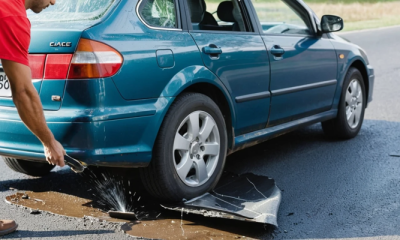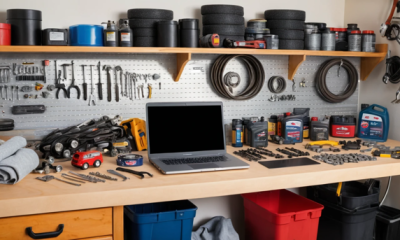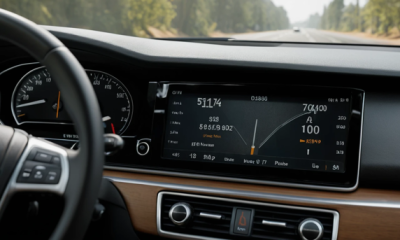Auto Insurance
Should I Buy My Car After Lease? Smart Tips & Happy Savings

Should I buy my car after lease? Discover if it’s the right move with expert tips, pros, cons, and savings advice in this easy guide.
Should I Buy My Car After Lease? 🚗 Let’s Break It Down
Ever stared at your leased car and thought, “Should I just keep it?” You’re not alone. When your lease ends, you face a big choice: buy it or let it go? It’s more than money. It’s about feeling good, being practical, and thinking about the future.
Let’s explore the good and bad of buying your leased car. You’ll get advice in easy words to help you choose what’s best for you.
🤔 What Happens When Your Lease Ends?
When your lease ends, you have three options:
- Return the car and walk away.
- Start a new lease with a different vehicle.
- Buy your leased car (a.k.a. lease buyout).
So… should you buy your car after the lease ends?
Short answer: Yes— if the car is reliable, below market value, and you love it.
But don’t rush to buy. Let’s look closer.
✅ Why You Might Want to Buy Your Leased Car
Buying your leased car has real advantages:
- You know its history—no surprises.
- It’s often in better condition than a used car.
- You may get it below market price if residual value is low.
- No haggling or dealership drama.
- You avoid end-of-lease fees or mileage penalties.
If you love the car and it’s in great shape, it could be a smart buy. But not always…
⚠️ Reasons Not to Buy Your Leased Car
Buying isn’t always the best choice. Watch out for these red flags:
- The buyout price is higher than current market value.
- The car had frequent mechanical issues.
- You want newer features or better fuel efficiency.
- You’re ready to switch car styles or needs.
🛑 If the numbers don’t work or your needs have changed, walk away.
💸 Understanding Your Lease Buyout Price
Your buyout price was set when you first signed your lease. It’s usually the residual value of the car, based on estimated depreciation.
Here’s what it includes:
| Lease Buyout Price Breakdown | Description |
|---|---|
| Residual Value | What the leasing company estimated the car would be worth at the end of the lease. |
| Remaining Payments (if early buyout) | What’s left if you’re buying before lease ends. |
| Fees & Taxes | Local sales tax, buyout fees, or title transfer fees. |
👉 Compare this price to the car’s current market value (use sites like Kelley Blue Book or Edmunds).
🧠 Is Your Car Worth More Than The Buyout Price?
If your leased car is worth more than your buyout price, congratulations—you’ve got built-in equity! 🙌
You can:
- Buy it and keep it for long-term savings.
- Buy it and resell for a profit.
- Use the equity toward your next car.
📌 This is one of the best reasons to purchase your leased vehicle.
🔍 How To Check Market Value vs. Buyout Value
To get a clear picture, follow this 3-step process:
- Look up your car’s value on KBB, Edmunds, or Carvana.
- Check your buyout amount in your lease agreement or from your dealer.
- Compare them to see if the car is a good deal.
| Value Type | Amount |
|---|---|
| Current Market Value | $19,000 |
| Lease Buyout Price | $16,500 |
| Potential Equity | $2,500 |
🎉 That’s free money in your driveway!
🧾 Should I Finance My Lease Buyout?
Can’t buy it in cash? No problem—you can finance the buyout through:
- Your bank or credit union
- Online auto lenders
- Some dealerships (though rates may be higher)
Pro tip: Shop around for the lowest APR. Credit unions often have better rates than big banks.
🧰 Pros & Cons of Lease Buyout Financing
| Pros | Cons |
|---|---|
| Keep the car you love | May pay more over time due to interest |
| Build ownership equity | May require good credit |
| Avoid new lease restrictions | Higher monthly payments than leasing |
📌 Make sure the monthly payment fits your budget and doesn’t exceed the car’s value.
🔄 How Does a Lease Buyout Compare to Buying Used?
Let’s say you’re torn between buying your leased car or getting another used vehicle.
| Factor | Buy Your Leased Car | Buy Another Used Car |
|---|---|---|
| Vehicle history | You know it! | Might be unknown |
| Cost | Often lower | Varies |
| Convenience | Simple process | Time-consuming |
| Risk | Low | Higher (accidents, wear) |
Bottom line: If your leased car is in great shape and fairly priced, it’s usually a better bet.
💬 What Do Dealers Think About Lease Buyouts?
Dealerships might try to convince you not to buy the car. This is true if the car is undervalued.
Why? They want to:
- Buy it back and sell it for more money
- Get you into a more expensive new lease
- Earn from leasing incentives
💡 Stand firm. You don’t owe them a new lease if your buyout makes more sense.
🧮 Crunching the Numbers: Real-Life Example
Let’s look at a scenario.
- You leased a car for 3 years.
- Monthly payment: $325
- Residual value/buyout: $16,000
- Market value: $19,000
- Buyout fees/taxes: $800
- Total buyout cost: $16,800
If you sell it tomorrow or trade it in, you might get $19,000–$20,000.
💰 That’s $2,200+ in extra money!
🤝 Can I Negotiate My Lease Buyout Price?
Usually, no. Most lease agreements have a non-negotiable residual value.
But there are two exceptions:
- Market crashes or inventory shifts (dealers want to move cars fast)
- Early lease termination offers or promotional buyouts
📞 Always ask—you never know what the dealer might offer.
🏷️ What About Extended Warranties?
When you buy your leased car, it may be out of warranty or close to it.
Ask yourself:
- Can I afford repairs without warranty?
- Does the car have a good reliability history?
- Would a warranty give me peace of mind?
🛠️ Optional extended warranties can cost $1,000–$3,000. Think about it based on the car’s age and condition.
🚘 When Does Buying Your Lease Make the MOST Sense?
You should strongly consider buying if:
- You’ve taken great care of the car
- It has low mileage
- It’s reliable and fuel-efficient
- You’re emotionally attached (hey, that matters too!) ❤️
- The market value is higher than the buyout price
❌ When You Should Definitely Walk Away
It’s probably not the best idea if:
- You’ve had major repairs or repeated issues
- Your lifestyle needs have changed (family, commute, etc.)
- The buyout price is above market value
- You’re excited to try something new
📅 Don’t Wait Until the Last Minute
Start exploring your lease-end options 2–3 months before it ends. This gives you time to:
- Check market value
- Secure financing
- Review paperwork
- Avoid surprise fees
🗓️ Planning ahead = peace of mind!
🧠 Key Takeaways
Should you buy your car after lease? Maybe—if it’s reliable, a good deal, and you love it.
Remember:
- Always check current market value
- Compare it to your lease buyout price
- Factor in condition, warranty, and financing
- Run the numbers like a boss before signing anything
💡 You’ve already driven this car—make sure it drives your financial future too.
🙋♀️ FAQs
Is buying my leased car a good idea financially?
Yes, if your buyout price is lower than its market value and it’s in good condition.
Can I buy my leased car if I have bad credit?
Yes, but you may face higher interest rates. Shop around for lenders that work with lower credit scores.
How do I find my car’s current value?
Use tools like Kelley Blue Book, Edmunds, or Carvana for a quick estimate based on mileage and condition.
Can I trade in my leased car instead of buying it?
Yes, if the car’s value is higher than the buyout price, you can trade it in and apply the equity.
Do I pay tax when buying my leased car?
Yes, sales tax is usually added to the buyout amount. Rates vary by state.
🔗 References
https://www.kbb.com
https://www.edmunds.com
https://www.consumerreports.org
-

 Care & Repairs3 weeks ago
Care & Repairs3 weeks agoHandling Vehicle Damage after an Accident: Smart Repair Tips for Peace of Mind
-

 Auto Parts3 weeks ago
Auto Parts3 weeks agoCheapest Online Store For Car Parts – Best Deals Guaranteed
-

 Auto Parts4 weeks ago
Auto Parts4 weeks agoFind Auto Parts Using VIN Number – Fast & Easy Method Today!
-

 Auto Parts3 weeks ago
Auto Parts3 weeks agoUsed Auto Parts with Warranty: Smart, Reliable & Budget-Friendly!






